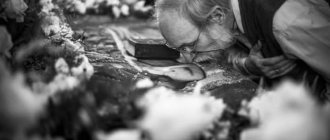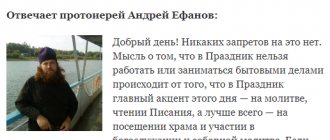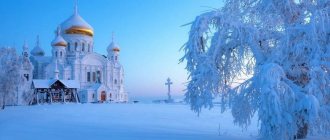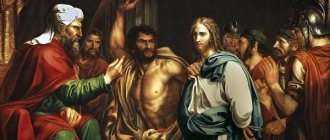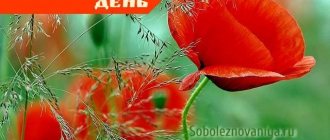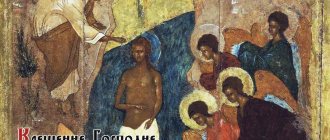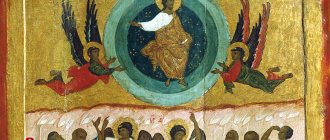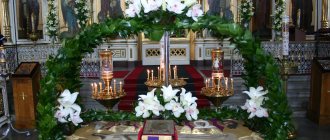The Saturday that comes immediately after Good Friday is called Great. This is a day of special sorrow, since it was at this moment that the body of the crucified Savior was laid in the tomb.
After Good Friday, when Christ was crucified, almost all eyewitnesses believed that they would never see him again. However, the very next day after Saturday, on Bright Sunday, Christ was resurrected - Easter came. Therefore, on Great (Holy) Saturday it is customary to observe a particularly strict fast, and also, if possible, to avoid conflicts and showdowns.
What kind of day is Great (Holy) Saturday?
Holy Saturday is a time of quiet sorrow: the worst has already happened, Christ endured torment, ended his earthly life and lies in the tomb. But the sorrow is mixed with the joy of anticipation of what will invariably happen in the coming hours: Jesus will rise again, trampling down death by death.
This was preceded by the events of the night of Good Friday: after the crucified Jesus died on the cross, his body was removed, washed, anointed with incense, wrapped in a shroud and buried. According to Jewish custom, Jesus was buried in a cave not far from Golgotha, the place of his execution.
Jesus' persecutors, although they did not believe in his divine essence, were not completely calm. Therefore, as the Evangelist Matthew tells us, on Holy Saturday the high priests and Pharisees went to the procurator of Judea, Pontius Pilate, and reminded him of Jesus’ promise to resurrect in three days. The persecutors of Christ asked the representative of Rome to give orders to take the burial place of Christ under special control.
They feared that the apostles would steal the body of their teacher and tell his followers that Jesus had risen from the dead. Pilate left this to the discretion of the high priests, and by their order the entrance to the cave with the body of Jesus was blocked with stones, and a guard was placed there.
Further events occur on Sunday, that is, they are part of Easter. How did these events unfold?
After the Sabbath rest, the myrrh-bearing women go to the tomb of Jesus. At this moment an angel appears and descends on the coffin. An earthquake occurs and the stone covering the entrance to the tomb falls off. The guards tremble with fear, and the angel informs the myrrh-bearing women that Christ has risen.
This message is brought to the apostles by Mary Magdalene, who was the first to come to the tomb. The apostles rush to the tomb and are convinced that Jesus is not in it - only his mortal shroud remains there. The Apostle Peter enters the tomb, is convinced of the resurrection of Jesus and reports this to the rest of the apostles.
A brief description of these events can be seen here.
Great Saturday of Holy Week of Lent
This is the most blessed Saturday, on which Christ, having fallen asleep, will rise again for three days. The final line of the kontakion and ikos
On Holy Saturday, the Orthodox Church commemorates the bodily burial of Jesus Christ and His descent into hell.
Descent from the Cross. Mosaic of the Church of the Resurrection of Christ in Jerusalem. Photo: A. Pospelov / Pravoslavie.Ru
The high priests and Pharisees knew that Jesus Christ had predicted His resurrection, but not believing this prediction and fearing that the Apostles would steal the Body of Jesus Christ and tell the people: He has risen from the dead, on Saturday they asked Pilate for military guards, assigned them to the tomb and they sealed the tomb itself (Matthew 27:57-66; John 19:39-42) and thereby delivered new confirmation to the truth.
Saint John Chrysostom writes: “Christ was laid in a new tomb, in which no one had been laid before, so that the resurrection could not be attributed to someone else lying with Him; so that the disciples, in the vicinity of this place, could easily come and be spectators of what happened, and so that not only they, but also their enemies would witness the burial. The fact that seals were placed on the coffin and a guard of soldiers was assigned was indeed, on their part, evidence of burial, since Christ wanted His burial to be no less certain than His resurrection. That is why the disciples zealously try to prove that He really died. His resurrection was confirmed throughout subsequent times: meanwhile, if His death at that time had been hidden and had not become completely known, this could have harmed the word about the resurrection.”
Position in the coffin. Mosaic of the Church of the Resurrection of Christ in Jerusalem. Photo: A. Pospelov / Pravoslavie.Ru
All days are surpassed by the holy Pentecost, but greater than the Holy Pentecost and the Great Week (Passionate) and greater than the Holy Week itself is the Great and Holy Saturday. For just as in the first world-making God, having created all creatures and on the sixth day having finally created man, on the seventh day he rested from all His works and sanctified it, calling it Sabbath, that is, rest: so in the work of the intelligent creation, having completed everything (the work of redemption ), and on the sixth day - Friday, having again restored man who had been corrupted by sin and renewed him with the life-giving cross and death, on the real seventh day the Lord calmed down, falling asleep in a life-giving and saving sleep. God the Word descends in the flesh into the tomb, and also descends into hell (1 Peter 3:19-20) with the natural and Divine soul, separated from the body through death and delivered into the hands of the Father, to whom He brought His Blood, which became our deliverance. . But the soul of the Lord was not kept in hell, like the souls of saints, for it was not subject to the ancestral oath. Our Lord Jesus Christ dwelt in the tomb bodily and with the Divinity united with the flesh; but at the same time He was in paradise with the thief and, as was said before, in hell with His naked soul, prenaturally He was like an indescribable, unlimited God. The Lord's body also experienced corruption, that is, the release of the soul from the body, but not the destruction of the flesh and members and their complete corruption. Joseph, taking the holy body of the Lord from the tree, buries it in a new tomb and in the vertograd, placing a very large stone over the entrance of the tomb. From now on, hell trembles and is amazed, feeling the most powerful force; and soon he, having unrighteously devoured, spews out both Christ, the hardest and cornerstone, and those whom he contained in his belly as food and pleasure for himself.
Descent into Hell
At Matins of Great Saturday, after the Great Doxology, the Shroud, while singing “Holy God...”, is carried out of the temple by the clergy at the head, with the participation of the people, and carried around the temple in memory of the descent of Jesus Christ into hell and His victory over hell and death. Then, after the Shroud is brought into the temple, it is brought to the open Royal Doors, as a sign that the Savior is inseparably with God the Father and that He, through His suffering and death, again opened the doors of heaven to us.
At the end of the Liturgy, there is a blessing of bread and wine, and in most churches there is a blessing of Easter cakes, Easter cakes and eggs.
At twelve o'clock at night the Midnight Office is celebrated, at which the canon of Great Saturday is sung. At the end of the Midnight Office, the clergy silently carry the Shroud from the middle of the temple to the altar through the Royal Doors and place it on the Throne, where it remains until the Feast of the Ascension of the Lord, in memory of the forty-day stay of Jesus Christ on earth after His Resurrection from the dead.
In a Study of the Orthodox Faith, Vol. 3, ch. 28
Hymns from the service on Saturday of Holy Week of Great Lent
| Troparion: Noble Joseph, I took down Your most pure body from the tree, wrapped it in a clean shroud, and covered it with stinks in a new tomb. | “The noble Joseph, having taken your most pure Body from the cross, wrapped it in a shroud and anointed it with fragrances, and laid it in a new tomb.” |
| Troparion: When you descended to death, Immortal Belly, then you killed hell with the brilliance of the Divine. When You raised those who had died from the underworld, all the Powers of heaven cried out: O Life-Giver Christ our God, glory to Thee. | “When You tasted death, O immortal Life, then You killed hell with Your Divine light. When You raised the dead in the underworld, all the Heavenly Powers cried out: Life-Giver Christ our God, glory to You!” |
| Troparion: To the myrrh-bearing women, an angel appeared at the tomb crying: peace is fitting for the dead, but Christ appeared alien to corruption. | “The angel, presenting himself to the myrrh-bearing women at the tomb, exclaimed: the myrrh is required by the dead, but Christ has not undergone corruption.” |
Gospel of Matthew
After the Sabbath had passed, at dawn of the first day of the week, Mary Magdalene and the other Mary came to see the tomb.
And behold, there was a great earthquake, for the Angel of the Lord, who came down from heaven, came and rolled away the stone from the door of the tomb and sat on it; his appearance was like lightning, and his clothes were white as snow; and being afraid of him, the watchmen trembled and became as if they were dead;
The angel, turning his speech to the women, said: Do not be afraid, for I know that you are looking for Jesus crucified: He is not here - He has risen, as He said. Come, see the place where the Lord lay, and go quickly, tell His disciples that He has risen from the dead and is going ahead of you to Galilee; you will see Him there. Here I told you. And, hastily leaving the tomb, they ran with fear and great joy to tell His disciples.
When they went to tell His disciples, behold, Jesus met them and said: Rejoice! And they approached, grabbed His feet and worshiped Him. Then Jesus says to them: Do not be afraid; go, tell my brothers to go to Galilee, and there they will see me. As they walked, some of the guards entered the city and announced to the high priests everything that had happened. And these, having gathered with the elders and held a meeting, gave enough money to the soldiers, and said: say that His disciples came at night and stole Him while we were sleeping; and if rumors about this reach the ruler, we will convince him and save you from trouble. They, having taken the money, acted as they were taught; and this word spread among the Jews to this day.
The eleven disciples went to Galilee, to the mountain where Jesus commanded them, and when they saw Him, they worshiped Him, but others doubted. And Jesus approached and said to them, “All authority in heaven and on earth has been given to Me.” Go therefore and make disciples of all nations, baptizing them in the name of the Father and of the Son and of the Holy Spirit, teaching them to observe all that I have commanded you; and lo, I am with you always, even to the end of the age. Amen.
Mf. 28, 1-20
* * *
If we died with Christ, then we believe that we will live with Him.
Rome. 6, 8
These are the words of the Holy Apostle Paul, which we heard with you, my beloved brothers and sisters in Christ, today at the Divine Liturgy during the apostolic reading. It is saving for us, first of all, to know what it means to die with Christ.
Of course, what is meant here is not physical death, for the Apostle used the word died in relation to living people, but death for the world, that is, for the passions. The same Apostle speaks about this in his Epistle to the Galatians: those who are Christ’s have crucified the flesh with its passions and lusts.
(Gal. 5:24). It is clear from here that we will die with Christ only if we mortify our passions of gluttony, fornication, love of money, anger, sadness, despondency, vanity and pride. And the mortification of passions is a feat that can be called voluntary martyrdom. Saint Theodore the Studite also taught this, saying that monks die every day through the cutting off of their passionate, sinful will. Therefore, they inherit the crowns of martyrdom, just like the holy martyrs.
Christ in the tomb
True, these patristic words were spoken to the monks. But martyrdom against passions, according to the thought of the Apostle Paul, is inevitable in the life of all who strive to be Christ’s. And how could it be otherwise, when the Lord commanded all his followers to follow a narrow and thorny path, saying: and whoever does not take up his cross and follow Me is not worthy of Me?
(Matt. 10:38). Thus, in order to live with Christ, you must first die with Him, that is, mortify your passions.
What does it mean to live with Christ? – To live with Christ means to be in unity with Him. And unity with Christ is nothing other than our love for Him, the desire of our heart to always think about Him, always prayerfully talk with Him and do only what is pleasing to Him. Love for Christ, as the Lord Himself teaches, is, in its essence, our fulfillment of His Divine commandments: If you love Me, keep My commandments
(John 14, 15). Therefore we will fulfill His commandments.
We will live with Christ if the fruit of our fulfillment of all His commandments manifests itself in our lives, that is, the Divine joy of Christ, about which He says: If you keep My commandments, you will remain in My love... My joy will remain in you, and your joy will be perfect
(John 15:10-11).
This joy of Christ in particular, as nowhere else, is given to all His true followers in the Sacrament of Holy Communion. Making us one with God by grace, this Sacrament gives us heavenly, heavenly bliss even in earthly life. And if we do not experience from Holy Communion the bliss that the holy saints of God felt, then it is only because we poorly fulfill the saving commandments that we do not want to part with our passions and do not mortify them in ourselves.
Therefore, my beloved children of Christ, let us have as our main concern the firm determination to fight passions until they are killed. Then we will live with Christ, that is, unswervingly fulfill all His commandments, and still enjoy here on earth their fruit - Divine joy, drawing it from many blessed sources of our Orthodox Church and, in particular, in the Sacrament of the Holy Eucharist.
In all its fullness, we will experience this joy for the mortification of our passions and the fulfillment of the Divine commandments in the afterlife, when we are united forever with the Lord who died for us and rose again for endless bliss in His Heavenly Kingdom, which may the Lord vouchsafe us in His ineffable mercy to us sinners. Amen.
Archbishop Seraphim (Sobolev)
Fasting on the Saturday before Easter: what you can eat
Holy Saturday is the only fast Saturday of the year. Since believers practically do not eat on Good Friday, they are allowed to eat on Saturday in order to withstand the night Easter service and celebrate Easter with dignity.
On Saturday, believers are allowed hot Lenten food without oil. But until the end of the service, all savory foods are strictly prohibited, and it is also forbidden to try ready-made Easter dishes.
For many, fasting is difficult, especially the last days, which are the strictest. But it is the one who passes the test who will be purified in spirit. After all, Easter will soon come, and everyone will greet each other with the words: “Christ is Risen” and “Truly Risen.”
Traditions
- Based on the weather on Holy Saturday, you can determine the weather for the summer: a clear and warm day promises a warm and sunny summer. If it is cloudy on this day, then summer will be cold and rainy.
- If you don't sleep on the night from Saturday to Sunday, you can attract happiness for the whole year. It is believed that it is on this night that happiness flows among people, and it is important not to oversleep it.
- If a blessed egg is thrown into water on this day and washed with it, it will make a person healthy and prolong youth.
- The last day of fasting is still considered a mournful day. On this day you cannot laugh and have fun. It is believed that a person who spends Holy Saturday in fun and laughter will cry all year.
- You cannot take anything out of the house on Holy Saturday, much less give it from home. It is believed that you can give away your well-being and wealth.
- Everyone knows that the memorial day is the first Sunday after Easter, but on Holy Saturday it is allowed to clean the graves.
- It is also forbidden to fish or hunt on this significant day, because during fasting it is forbidden to consume products from killed animals. Therefore, you should not do this, so as not to incur misfortune on yourself.
- It is on Holy Saturday that services begin in Orthodox churches. Every Orthodox person waits for this day to test himself and commit himself to all-night prayer. It will not be easy for an unprepared person to do this, but if you try, then at the end of the Easter service you will be visited by indescribable grace, and the whole year will be happy and full of health for you.
- Housewives always painted eggs and baked Easter cakes on Holy Saturday. The most common color for dyeing eggs is red. You can also give free rein to your imagination and paint the eggs by hand. Every woman has her own proven recipe for Easter cakes, and every housewife turns them out in her own way. The general rule for preparing Easter cakes is that there should be an appropriate environment in the house. In the room where the dough will rise, you need to walk quietly and exclude swearing and foul language from the conversation, so that your Easter cakes are prepared in peace and love.
- Holy Saturday is a day of peace and kindness. Therefore, ask forgiveness from your family and friends. Maybe you offended someone with a word or deed. Do not drag the weight of grievances with you on this bright holiday.
- Also, on the Saturday before Easter, you must give alms to all the needy people you meet on your way. Well, your relatives and people close to you should not be left without Easter gifts. As throughout Holy Week, on Holy Saturday you cannot celebrate weddings, birthdays, various celebrations or generally have fun.
What you can do on Holy Saturday
Holy Saturday is dedicated to rest, reflection on the eternal and quiet sorrow. According to tradition, by this day all preparations for Easter should already be completed. You need to pray, bless Easter cakes, and immerse yourself in godly thoughts.
On this day, you need to think about your past and future, rethink your life priorities and values, ask for forgiveness from God, as well as from all your loved ones and friends. It is correct to attend church services, which begin early in the morning and continue throughout the day.
Moreover, in the evening it turns into the all-night vigil, and then the Holy Resurrection begins. One of the most famous rites of Holy Saturday, in which both priests and laity take part, is the procession with the shroud, which is carried around the temple while chanting.
Divine services
On Holy Saturday, the church remembers the bodily burial of Jesus Christ and His descent into hell.
On Holy Saturday of Holy Week, special services are held in Orthodox churches - they are scheduled to begin on Friday evening. The church service is both mournful and celebratory in nature, since Holy Saturday ends Holy Week and is the beginning of Easter.
According to the schedule, on Holy Saturday in the morning or on Friday evening in churches, Vespers is celebrated with the Liturgy of St. Basil the Great - one of the most profound services of the year in terms of content.
During the service, fifteen proverbs are read - excerpts from the books of the Old Testament, containing prophecies about the Resurrection of Christ.
During the service of Holy Saturday, at Matins, a procession of the cross is performed with the singing of the funeral “Holy God...”. The Holy Shroud is flown around the temple. The Son of God, through whom “all things were made,” lies in the tomb like a dead man, while at the same time saving the world and opening tombs.
Services in churches end at the end of the Liturgy, after which the book of the Acts of the Holy Apostles is read. Then eggs, Easter cakes and paskas are blessed in churches, and from five or six in the evening the believers are confessed.
In Jerusalem, on Holy Saturday, a service is held and the Holy Fire is taken out - a symbol of the resurrection of Christ.
A special service - the Midnight Office, during which the Shroud is transferred to the Throne, where it remains until the Ascension of Christ - exactly 40 days, is held shortly before midnight.
What is forbidden to do on Holy Saturday
Since this day is dedicated to the sad events described in the Gospels, one should not indulge in idle fun, use foul language or quarrel. Carnal pleasures on this day are considered a great sin.
Cleaning the house, as well as doing laundry, is no longer allowed. The last time cleaning was carried out was on Maundy Thursday, and houses cannot be cleaned until the next Sunday after Easter.
You can’t prepare for Easter on this day either. All preparatory work needs to be completed this week. All fast food products, as well as ready-made Easter dishes, are strictly prohibited.
The strictest prohibition on Holy Saturday concerned metal objects: as on Good Friday, they were strictly forbidden to be picked up. The ban is due to the fact that Christ was nailed to the cross with metal nails.
On this day it is prohibited to hunt and fish. You cannot remember the dead. On Holy Saturday, as on Easter, it is not advisable to go to cemeteries. The best time to visit the cemetery is on Radonitsa, which in 2022 will occur on Tuesday, May 3.
Story
According to the Holy Scriptures, on the night of Holy Saturday of Holy Week the Savior was buried. According to the custom of the Romans, the bodies of the crucified were left on crosses, but with the permission of the authorities they could be buried. Therefore, Joseph, having bought the Shroud - a long cloth, in which the Jews buried the dead, after the crucifixion and death of Christ, came to Pilate and asked the procurator for a body for burial.
The body of Christ, having been removed from the Cross, was washed, anointed with incense, and wrapped in the Shroud, it was buried in a special cave, not far from Golgotha, which belonged to Joseph. On Holy Saturday, the Pharisees, who knew Christ’s prophecy about His Resurrection, went to Pilate and asked to place a guard at the tomb, allegedly fearing the theft of the body.
The Roman procurator in Judea ordered the entrance to the tomb of Jesus to be blocked and a guard posted. But the tomb, despite all efforts, turned out to be empty on Sunday, which became indisputable proof of the truth of the Resurrection of Christ.
Is it possible to clean on Holy Saturday: the opinion of the Church
Among the people there are quite a lot of interesting traditions and even prohibitions associated with Holy Saturday. It is believed, for example, that on this day you should not do your usual things, including cleaning up the house. But on the other hand, Easter comes the next day, and how can you leave the house uncleaned?
In fact, most of the prohibitions have nothing to do with the church - they are, rather, superstitions or misconceptions. You can also clean and do housework on Holy Saturday. The main thing is that this does not distract from more important matters - for example, visiting church and preparing for the bright resurrection.
What are church services like on this day?
Believers need to remember the restrictions of Holy Saturday, as well as some prohibitions during the strictest week of fasting. At this time, people do not get married, do not hold celebrations or holidays - the atmosphere of the day should be filled with calm, peace and light. It is recommended for every Christian believer to attend all church services taking place at this time and listen to the sermon on Saturday of Lent.
How is Matins going?
The semantic center of Matins on Holy Saturday becomes the ritual of “burying the shroud.” This ritual is associated with the burial of the deceased Christ, who, as all believers know, will then rise again! The sermon on Holy Saturday necessarily touches on this topic.
The shroud is the veil that was used to cover the mortal body of Jesus Christ before burial. Believers are invited to participate in the service dedicated to the memory of the burial of Christ, to experience the time when the entire believing world repented for their sins at the moment when the body of the Son of God was discovered.
Liturgies and services
Holy Saturday according to the Orthodox calendar in 2022 is a calm day, we can say that it is a day of waiting and silence. At this time, it is recommended to refrain from excessive activity and difficult tasks as much as possible. The souls of believers at this moment are focused on the events that happened with Jesus Christ. Thus, according to history, the Saturday after the crucifixion of Christ (Friday) is associated with anticipation and obedience before the mystery of the Resurrection.
“Human flesh is silent” - these words best describe the example of behavior on Holy Saturday. The Liturgy of Holy Saturday takes place as usual, but speaking on this day is not recommended.
Time to light up the eggs and cakes
On this day you can also take Easter treats - Easter cakes and eggs - to church to bless them. The service on Holy Saturday with the blessing of eggs and Easter cakes is just another opportunity to get in touch with Easter events. Often, sanctification is simply the awareness of unity with faith, at least in simple things, for example, through daily food.
Descent of the Holy Fire
Church services these days have their own characteristics, and this is not only a procession with the shroud, but also the ceremony of the descent of the Holy Fire (Holy Light). It takes place annually in the Church of the Holy Sepulcher in Jerusalem, and many believers consider it a miracle.
At about 3 p.m. Moscow time, the Holy Fire, which, according to Christian teaching, symbolizes the “true light,” is taken out of the edicule (in Latin: “peace, bedchamber”). This is a small marble chapel in the center of the rotunda of the Church of the Resurrection of Christ (Holy Sepulcher) in Jerusalem. The Edicule is erected over the tomb of Jesus and the side of the angel.
The ceremony of the descent of the Holy Fire into the Edicule symbolizes the resurrection of Christ. The priests and believers gathered in the temple are anxiously awaiting this moment.
From the fire brought by the Patriarch of Jerusalem, believers light candles, which illuminate the chapels of the temple. It is believed that in the first minutes the Holy Fire hardly burns and is healing.
Then the lamps, lit from the Holy Fire, are sent to Orthodox churches around the world, including Russia. A particle of fire is brought to the largest churches in Moscow, St. Petersburg and other cities. The ceremony is widely covered in the media.
Orthodox Life
What is special about the services of Maundy Thursday, Friday and Saturday.
The last days of Holy Week begin. If the first days of this holy week were dedicated to the last days of the Savior’s public ministry, then on these days the suffering, death and burial of Jesus Christ are directly sung. The services of these days are unlike any other service and represent the pinnacle of our church year.
On Maundy Thursday, the Church remembers the Last Supper and the establishment of the Sacrament of Communion, therefore the entire service of this day is permeated with the theme of the Eucharist. In most churches, Maundy Thursday services begin on Wednesday evening - Maundy Thursday Matins is served. At this service, an amazingly beautiful canon is sung: “The Red Sea is being cut” (in Russian - “The Red Sea is being cut by a blow”). This canon contains various Old Testament images of the Eucharist, and also narrates the events of the Last Supper in a beautiful artistic form.
Patriarch Kirill performs the Rite of Washing Your Feet on Maundy Thursday
On Thursday morning, a Liturgy is celebrated, at which, according to tradition and the Charter, everyone must partake of the Holy Mysteries, because this Liturgy is served in honor of the establishment of the First Liturgy. According to the Church Charter, it should be celebrated in the evening, like the Last Supper, but now this is difficult to achieve. This whole service takes us to the upper room, where Christ celebrated the Old Testament Passover with his disciples, and the main hymn of this day is “Today Your Mystical Supper, O Son of God, accept me as a partaker” (in Russian “Today accept me as a participant in Your Mysterious Supper, O Son of God ") - reminds us that during each Liturgy we do not make a new Sacrifice, but become invisible participants in that first Eucharist, performed by the Savior with his disciples. In large churches, bishops perform another rite during this service on this day, which also takes us to the Upper Room of Zion - the rite of washing the feet. The bishop washes the feet of twelve priests in memory of how the Savior washed the feet of his disciples.
Reading the 12 Gospels
Good Friday services are directly dedicated to the story of the Passion of Christ. The first service of this day is also served according to tradition on Thursday evening. According to our Charter, it is called “Following the Passion of our Lord Jesus Christ,” but everywhere it is called the service of the 12 Gospels, according to the number of passages from the Gospel that are read at this service. To understand where these gospel passages come from, we need to look at the history of this worship service. This service dates back to the service in Jerusalem in the middle of the first millennium. Good Friday services in Jerusalem were then held not in one church, but throughout the city. On the night from Maundy Thursday to Friday, people first gathered in the Garden of Gethsemane. There the Gospel about the taking of the Savior into custody was read, then the priesthood and believers, singing various hymns dedicated to the suffering of the Savior, went to the place where Jesus Christ was interrogated, the Gospel was also read there, then also with hymns they went to Pilate’s palace, etc. It was this service served as the basis for our 12 Gospels service. The Gospels correspond to the stops of this Jerusalem procession, and the chants sung between them correspond to the hymns that were sung during the movement of this procession.
On the morning of Good Friday the Royal Hours are celebrated. They received their name due to the fact that in Constantinople the emperor usually came to services during the Liturgy and was not present at the hours. But on Good Friday the Gospel of the Passion of Christ is read on the clock, so on that day he came to the clock. In total, in our Orthodox worship there are four services of the hours - the first, third, sixth and ninth. This number coincides with the number of Evangelists, therefore, at each hour, in addition to the psalms and Old Testament prophecies about the Passion of Christ, a story about the Passion of one evangelist is read.
The rite of wearing the Shroud
On the evening of Good Friday, and in some places immediately after the royal hours, Vespers of Good Friday is celebrated. On it the Gospel of the Passion of Christ is read again, but already compiled in parts from each evangelist, so that a large and complete narrative is obtained. Thus, on Good Friday we hear the story of the Lord’s suffering in three versions: first in small passages in the service of the 12 Gospels, then in full by each evangelist, and at the end - a composite narrative. All this helps to fully understand and experience the Mystery of our Salvation.
At the end of Vespers on Good Friday, the Shroud is carried into the center of the temple - a large cloth with an embroidered or painted image of Jesus Christ lying in the tomb; then, before this image, one of the most piercing canons in our worship is sung - the Canon of the Lamentation of the Virgin Mary. It represents the crying and lamentation of the Mother of God during the suffering and burial of the Savior.
Procession with the Shroud
Holy Saturday is the most unique day of the year. It seems that this is still Holy Week, but the theme of the coming Easter is already running through the entire service. On Friday evening, and in some churches late at night, an amazing service is performed - the Burial of the Savior. Over the Shroud, the priests and choir sing Psalm 118 (which is usually read over the deceased), but a small chant is also added to each verse of this psalm. These chants are called praises: they either take us to the Tomb of the Savior, or sing about His descent into hell, or even talk about the future Resurrection. Next, the Sunday hymn “The Council of Angels” is sung, which speaks of the myrrh-bearing women who came to the tomb. Easter is taking over worship more and more. At the end of this service, a procession with the Shroud takes place. This procession has a twofold explanation: it symbolizes both the burial of Christ and His descent into hell.
On the morning of Holy Saturday, the Liturgy is celebrated. It is preceded by a long reading of 15 passages from the Old Testament, which contain prophecies about the Resurrection of Jesus Christ. Such a large number of readings is due to the fact that in ancient times in Constantinople at this moment catechumens were baptized in the baptistery. The baptism had to end with the reading of passages, so that the newly baptized would enter the temple while singing the hymn “Be baptized into Christ.” There have been no mass baptisms on this day for a long time, but the Old Testament readings, the hymn “Elitsa”, as well as the reading from the Epistle of the Apostle Paul to the Romans about baptism remain. This service ends with the blessing of bread and wine. In ancient times, people, having refreshed themselves, did not go home, but stayed in the temple to listen to edifying readings and prepare to celebrate Easter.
Thus, all the services of Holy Week are filled with deep meaning, which helps us to survive the suffering of the Lord, and most importantly, to prepare for the Feast of Holidays - the Bright Resurrection of Christ, the saving Easter of God.
Alexander Adomenas
Signs on Holy Saturday
Weather signs and everyday beliefs are associated with Great Saturday:
- What the weather is like on Holy Saturday, so will the summer be.
- It is undesirable to borrow anything, be it money, food or any household items. Thus, you can give your luck and well-being to a stranger.
- If on Holy Saturday you put a colored egg, blessed in the church, into water, the water becomes healing.
- It is advisable not to go to bed on the night from Saturday to Sunday, especially since Easter services are held in churches at this time. It is believed that the one who stays awake will ensure health and good luck for the next year, and an unmarried girl will have a happy marriage. The ancestors believed that happiness was nearby on this night, so it was very important not to oversleep it.
How to prepare for Easter?
All the days of Holy Week, in parallel with intense divine services, preparations are underway for the celebration of Easter. Holy Saturday is the day when we bring food to the temple, as they say, “for consecration.” In fact, we are talking about the blessing of food: neither eggs, nor Easter cakes, nor boiled pork with sausage and wine become consecrated, much less sacred. The consecration of the festive Easter food is not a Sacrament of the Church, but a pious tradition. In connection with the ongoing pandemic, priests urge believers to comply with sanitary and epidemiological requirements during the consecration of eggs, Easter cakes, and cottage cheese Easter, so as not to expose themselves or other believers to the risk of infection. Those who did not have time to stand in long lines at the consecration tables on Holy Saturday are advised not to despair: after the night Easter service, the consecration of colored eggs, Easter cakes and other foods will continue.
“On Strastnaya, amidst the pre-holiday hassle, they strictly fasted,” we read from Ivan Bunin in “The Life of Arsenyev.” — By the evening of Holy Saturday, our house shone with utmost purity, both internal and external, blissful and happy, quietly awaiting in its beauty the great holiday of Christ. And then the holiday finally arrived - on the night from Saturday to Sunday, some wondrous turning point took place in the world, Christ conquered death and triumphed over it.”
The festive Easter service will begin on Saturday late in the evening, half an hour before midnight. His Holiness Patriarch Kirill of Moscow and All Rus' will celebrate it in the Cathedral of Christ the Savior; the festive service includes a procession of the cross, Easter Matins, with the reading of the famous “Word for Easter by St. John Chrysostom” and the Divine Liturgy.
Wait a little, soon the holiday of holidays - Easter, the Holy Resurrection of Christ.
Holy Week: What to eat and what not to do
Having descended in the flesh (body) into the tomb, the Lord with the Divine soul descends into hell, and the bonds of hell are destroyed, the ancestral sin is burned by the power of the Life-Giving Cross and the Blood of the Savior of the world, the righteous come out of hell. Hell has been defeated, darkness has been dispelled, and this terrible abandonment of God that existed before is no longer there. And by victory over hell, the Lord testifies to His power, for it was said by Christ: “All authority in heaven and on earth has been given to me.” And Satan does not even rule over hell, since there is only one single authority over heaven and earth, over the whole world - that of our Lord Jesus Christ.
The purpose of the Savior’s earthly life was fulfilled. But we must remember that heaven and hell originate on earth, and it depends only on our good will which path we choose. The Truths of Eternal Life are revealed to us and we need to work a little so as not to go against God’s plan and not fall into the abyss. Holy Saturday shows us how everything remains in the past - suffering, Golgotha, death, but here the Gates of Eternal Life open to us.
And how can we not mention the myrrh-bearing women, who from the very early morning will run to the tomb to do everything necessary according to the rituals of the Jews. Without thinking about who will roll away the stone from the door of the tomb, which is simply too heavy to lift, not understanding how they will get there, but they are led there by the unbearable pain of loss and love for their Teacher. Having run there at dawn, they will be the first to see the stone rolled away from the thunder; they will not find the Body of Christ, but they will see an Angel, who will tell them that Christ has risen... The image of the myrrh-bearing woman - quiet, sincere, sacrificial - is the image of a soul that is confident in that that Love always conquers death.
And since the day of Saturday, according to church tradition, begins on Friday evening, then during Friday evening, a procession of the cross takes place, carrying the Holy Shroud, going around the temple.
This is the day when it is first said that Saturday is the most blessed seventh day, when the Lord rests from His labors in creating the world.
On Saturday morning, one of the most beautiful services of the year is served - the Liturgy of St. Basil the Great. 15 proverbs (passages) from the Old Testament are read, which prophesy about the Resurrection of Christ. And on this day one of the main miracles that has ever been known to the world takes place - the descent of the Holy Fire.
Descent of the Holy Fire. Video
In most churches, the blessing of paskas and eggs begins with lunch. And at twelve o’clock at night the Shroud is transferred from the center of the temple to the altar.
Resurrection of Christ
Descent from the Cross. Mosaic of the Church of the Resurrection in Jerusalem
Christ is still in the tomb, but everything around is already filled with Easter joy. Joseph, a member of the Sanhedrin, came to ask Pilate to remove the body of Jesus from the Cross for burial. According to the customs of the Romans, the bodies remained on the cross, but they could only be removed with the permission of the authorities.
Having received permission, Joseph and Nicodemus took the Body of Jesus Christ from the Cross, wrapped it in a shroud, and laid it in a new tomb, where no one had yet been laid. And since the Pharisees knew that Christ was talking about His Resurrection, they placed a guard of soldiers at the tomb and put seals on the tomb for fear that the Apostles would steal the Body of Christ and then say that He had risen.
As it is said in the Old Testament, after creating the world for six days, God rested from his work on the seventh day. And it was a day of rest, called the Sabbath. So Christ, having suffered for human sins, rested in saving sleep on the seventh day.
Good Saturday May 1, 2022: what you can and cannot do the day before Easter
Great Saturday is the name given to the day before Easter - the Resurrection of Christ. People also call it Silent Saturday and Painting Saturday. The main name is due to the fact that Saturday represents the last day of Holy Week. These were the last days in Christ’s earthly life. On Good Friday, Jesus was crucified. Saturday is the day when the body of Christ was in the tomb. And the grief of those who were close to the Savior was very strong. The crucifixion of the body of Christ was a terrible shock for his disciples. They had no hope for the miracle of the Resurrection. This is why Holy or Holy Saturday is a truly dramatic day. And therefore, it is not customary to organize any entertainment, go to visit, sing and dance, or plan any celebrations for this day, be it weddings, birthdays, various anniversaries. It is not customary on this day to engage in so-called pleasures of the flesh - gluttony, drinking and others. Therefore, the day of Holy Saturday is also called quiet - believers should refrain from worldly noise. It is believed that one should give up working in the garden, hunting and fishing. There is no need to shed anyone's blood on this day. Therefore, all preparations for the Easter table in the villages were made in advance. How to spend this day with dignity and benefit:
- You can feel the atmosphere of Holy Saturday by learning the history of this day. Find out what is inherent in its traditions. What does each of them mean? All this together will explain what exactly is not allowed and what can be done during the hours of Holy Saturday.
- The main thing is that on this day you need to be able to restrain any passions. Strive to refrain from any disputes, disagreements, especially harsh words, curses and foul language. Just try to contain your irritation.
- There is no need to sort things out. The bright holiday of Easter is ahead. And the mood in anticipation of it should be bright and joyful.
- It is not recommended to do housework and heavy physical labor on this day. It is worth planning your affairs in such a way as to complete everything necessary before the hour of sorrow.
- Even at home, with family, it is not customary for believers to laugh and have uncontrollable fun on the Saturday before Easter. After all, no one would do this on days of mourning for their loved ones. On Holy Saturday, Christians remember the suffering and death of Jesus Christ, close to millions of believers.
- On this day, Christians especially remember Christ, so it is important to pay attention to your spiritual life - to attend church services. On Holy Saturday it begins early in the morning and continues throughout the day. In the evening it goes into the All-Night Vigil service. And only then comes the Holy Resurrection.
- Popularly, Saturday is also called Painting or Red Saturday, because housewives are completing the final preparations for Easter - painting eggs, baking Easter cakes. Traditionally, it is customary to finish all the housework for cleaning the house on Maundy Thursday; the church does not prohibit doing business on Saturday.
- On such a day you can read the Bible, perform prayers, do good deeds, and help those in need. It is worth visiting elderly or sick relatives and friends and providing all possible assistance.
- You can ask for forgiveness and forgive other people yourself.
You can also take care of the customs of the upcoming holiday - traditionally, housewives begin collecting Easter baskets to bless the fast food in the church.
What can you eat on the Saturday before Easter:
- This is the last day of Lent, so it is better to try to stick to the restrictions. You can be content with this menu: plain bread, fruits and vegetables in any form, water.
- The Saturday meal before Easter is permitted only after the end of the All-Night Vigil in the church. In fact, Lent ends on Sunday, when after the service the believers solemnly exclaim: “Christ is risen! Truly risen!”
- Only after this can you taste Easter cottage cheese, eggs and other food. The parishioners go home, rest and go to bed.
But the real Easter holiday comes a few hours after Easter night - and it lasts a whole week. Folk signs and beliefs on Holy Saturday:
- As we know, this is a particularly dramatic day: the body of the Savior has already been taken from the cross and placed in the tomb. Of course, on such a day you should refrain from any quarrels, and even irritation is better left for later. And you also need to pay attention to the following folk signs and beliefs:
- It is better not to plan any noisy parties on Holy Saturday. Even if it’s a birthday, you should celebrate it as modestly as possible. If you throw a feast for the whole world, then this is an unkind sign: the year may not turn out as successfully as you planned.
- It is also popularly believed that you should not take out the trash or anything from the house on Saturday, including lending money. Wait until Sunday - because if you disobey, it can cause minor troubles, failures and harm you.
- If Easter cakes turned out great on Holy Saturday, this is a very good symbol: the year will work out and will delight loved ones with pleasant events.
- If you wake up exactly during the Easter dawn and see it, a new bright streak will come in your affairs.
- If you dreamed about a deceased relative on Easter night, this is a very good sign. There is a belief that then in the coming year all family members will be healthy, and no misfortunes will affect them.
- It is better to try not to oversleep the morning service and generally get up early. Being late for church is a bad sign.
- It is interesting that even hunters have a unique system of Easter symbols and signs. But the most important rule is that on such a day it is strictly forbidden to shed the blood of animals, this is considered a great sin. Therefore, hunting and fishing are worth the wait.
- If it was clear and warm on the Saturday before Easter, then the whole summer will be clear and sunny. And if the weather is cloudy, it will be a cold and rainy summer.
